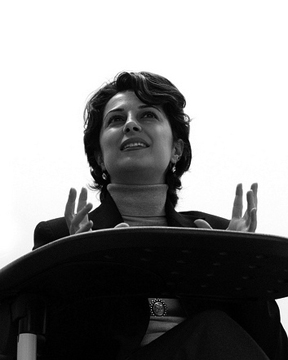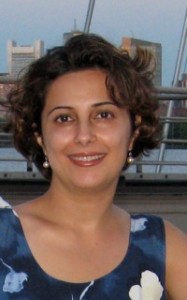Nazila Fathi is a Shorenstein Fellow at the Harvard Kennedy School of Government. Before her current role at Harvard, she was a Tehran correspondent for The New York Times for 17 years. As one of the first female journalists in post-revolutionary Iran working for a major Western news media outlet, Nazila worked with some of the leading Western journalists in Iran, who struggled in their coverage of the country due to various government-imposed restrictions. She left Iran during the turmoil that followed the re-election of Mahmoud Ahmadinejad for a second presidential term.

Nazila Fathi: Former Tehran correspondent for the New York Times, now at Harvard Kennedy School of Government
How long have you been at Kennedy School of Government at Harvard? Tell us about your involvement at the Neiman Foundation and the Shoreinstein Center.
I came to Neiman as a fellow in August 2010. It was an opportunity to relax from deadlines and an opportunity to expand my horizon. My focus at Neiman was the role of social media and satellite TV in Iran as well as other countries. It was a one-year (two semesters) fellowship. This year (2012) I’ll be doing another fellowship again at Harvard. I’ll be at Joan Shoreinstein Center at Harvard Kennedy School of Government.
How long did you work for the New York Times?
I started at NYT from 1992. I became a stringer in 1995 and got credentials from the Iranian government until 1999. I left Tehran three weeks after the post-election uprising and continued writing for NYT from Toronto from July 2009 until Aug. 2010. I worked for the NYT for a total of 17 years.
Were you born in Iran? Yes, I was born in Tehran.
Tell us about your education please.
I was a translator in Tehran in 1991 helping foreign journalists in Iran after the Roodbar earthquake. I studied English translation in Tehran. Then I got my masters program in political science and women studies at the University of Toronto.

Nazila Fathi
How did you end up in the journalism profession?
I learned journalism along the way working with some of the best names in journalism such as Thomas Friedman, Elaine Sciolino, and Douglas Jehl.
Who would you name among some of your main source(s) of inspiration in your journalistic achievements?
Elaine Sciolino was my mentor, who held my hand and took me step by step along the way.
In the course of your career as a woman working in a major international news organization, what have been some of the key challenges you encountered?
The first key challenge was being an Iranian working with a big news org. The Iranian government was uncomfortable with this from the outset. It took me four years to start writing with my own byline. Government officials consistently opposed allowing women to work for major news organizations in Iran. Gradually, the government valued us because we helped present a humane face of Iran. I had a deep knowledge of Iran and I was a better person to write about Iran than a western journalist coming to Iran with certain perceptions who also had to rely on government-assigned translators.
How do you think being an Iranian woman or a woman of Iranian descent has played itself out in your career?
I was able to have access to female figures in Iranian social and political life. It was much more advantageous as a woman.
If you are a mother, how many kids do you have?
I have two kids. An eight year old son and a 6.5 year old daughter.
How do you think the Arab Spring will impact women’s social status in the Arab/Islamic world? Are you an optimist?
I am an optimist. Of course, democracy is not a package that can be imported overnight. Change will be hard, but I have no doubt that it will bring positive change for women in the Arab world. They have become more educated and are more aware of their surroundings and thus of their rights. They are more active in the political and social scenes. As a result, they demand more rights. It also seems that they are the moderate voice, the voice that calls for non-violence and reform. This is very important in the current volatile situation in which we are one step away from chaos. The presence of Arab women is important not only for themselves, but also for a democratic and peaceful process.
Ten years from now, what kind of an Iran do you envision in your mind?
It’s a fool’s job to predict what will happen on a leadership level, specifically about Iran, a place where nothing has been predictable. But no matter what happens, Iran and the Iranian society are improving and moving forward. Education levels are rising and the information revolution has made people more informed and, therefore, they continue to make wiser choices. This means that the Iranian society looks forward to an opportunity to make a leap forward. So no matter what happens on the leadership level, the society will be more sophisticated in ten years time.